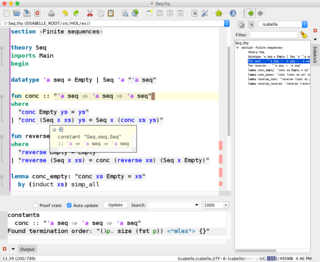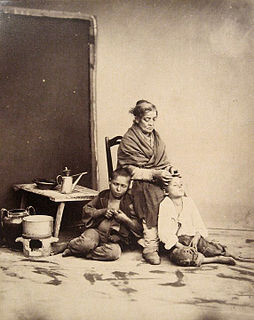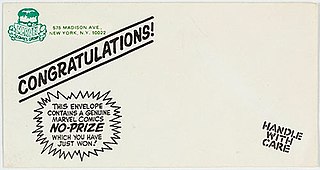
A straw man is a form of argument and an informal fallacy of having the impression of refuting an argument, whereas the real subject of the argument was not addressed or refuted, but instead replaced with a false one. One who engages in this fallacy is said to be "attacking a straw man".

The Isabelle automated theorem prover is a higher-order logic (HOL) theorem prover, written in Standard ML and Scala. As an LCF-style theorem prover, it is based on a small logical core (kernel) to increase the trustworthiness of proofs without requiring — yet supporting — explicit proof objects.

alt.tv.simpsons is a usenet newsgroup dedicated to discussing the American television program The Simpsons. Created in 1990, the newsgroup became a popular community in the early 1990s, and continues to exist as of 2020. It is known for reviewing episodes and nitpicking minor details on the show.
A sledgehammer is a large manual impact tool which has a metal head distinguishing it from a mallet with head made of softer material.

Nitpicking is a term, first used in 1956, that describes the action of giving too much attention to unimportant detail. A person who nitpicks is termed as a nitpicker.

The Marvel No-Prize is a fake or satirical award given out by Marvel Comics to readers. Originally for those who spotted continuity errors in the comics, the current "No-Prizes" are given out for charitable works or other types of "meritorious service to the cause of Marveldom". As the No-Prize evolved, it was distinguished by its role in explaining away potential continuity errors. Initially awarded simply for identifying such errors, a No-Prize was later given only when a reader successfully explained why the continuity error was not an error at all.
Copacabana most commonly refers to:

Phil Farrand is an American computer programmer and consultant, webmaster and author. He is known for his Nitpicker's Guides, in which he nitpicks plot holes and continuity errors in the various Star Trek television programs and movies, and for the creation of Nitcentral, a website devoted to the same activity. Subsequent to his Nitpicker's Guides, he has ventured into fiction as a novelist.
Isabelle of Orléans or Isabelle d'Orléans may refer to:
Izzy is a common nickname for the given names Israel, Elizabeth, Isaac, Isambard, Isidor, Isidore, Isidora, Isabel, Isobel, Isabelle, Isabella, Isaiah, Ishmael, Izzet, Isarn, Ismail, Isobel, Isra, Izebel, Izmara, Isobelle or Isam (عصام).
"Syzygy" is the thirteenth episode of the third season of the science fiction television series The X-Files. The episode first aired in the United States on January 26, 1996, on Fox. It was written by series creator Chris Carter and directed by Rob Bowman. The episode is a "Monster-of-the-Week" story, unconnected to the series' wider mythology. "Syzygy" earned a Nielsen household rating of 10.8, being watched by 16.04 million people in its initial broadcast. The episode received mixed reviews, with many critics and fans upset by the negative portrayal of Mulder and Scully.
Muphry's law is an adage that states: "If you write anything criticizing editing or proofreading, there will be a fault of some kind in what you have written." The name is a deliberate misspelling of "Murphy's law".
Isabelle is a French feminine given name.
Princess Isabelle may refer to:
Isabelle Olsson may refer to:
Isabelle Thomas may refer to:
This page is based on this
Wikipedia article Text is available under the
CC BY-SA 4.0 license; additional terms may apply.
Images, videos and audio are available under their respective licenses.





